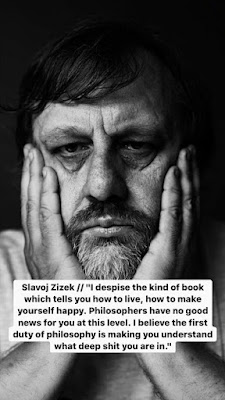Slavoj Žižek: The Sublime Object of Ideology
Slavoj Žižek is irrepressible.
He continues to produce at least two books a
year in English and may well have just published what will become his magnum opus, The Parallax View (MIT Press, 2006).
The secondary literature
on ÎiÏek has also now begun to emerge at an astonishing rate.
Žižek tends to be read in a very decontextualized way.
Žižek's contribution to a Marxian understanding of ideology has been the structuring role of phantasy, not the idea that it works through the subject.
Žižek is a brilliant reader of Hegel and Lacan, but is not an original thinker like Lacan, who formulated his own terminology, or
Hegel, who developed his own philosophical system.
He has created a startling hybrid of Hegelianism and Lacanese, but the terms and concepts he deploys remain largely Lanan's.
As Kay points out, while Žižek is often viewed as the great popularizer of Lacanian psychoanalysis through such parly texts as
"Looking Awry: An Introduction to Jacques Lacan Through Popular Culture" (1991), and
"Enjoy your Symptom: Jacques Lacan in Hollywood and Out" (1992), he actually returns to a very limited number of reference points and seminars out of Lacan's total oeuvre.
As Stavrakakis, Grigg, Boucher and Parker all argue, it would be a mistake to start reading Žižek in place of Lacan.
One of the constant categories of Žižek's political writing, notes Kay, has been the notion of “the act” as “a
violent disruption of the status quo that might make it possible to puncture
the prevailing ideology and effect political change.
it is “the enumeration of a network of reasons, masking the unbearable fact that the Law is
grounded only in its own act of enunciation” (1997: 100).
And we can certainly see how the
ideological fantasy of witchcraft offers a “rationalisaiton” for the various conflicts in Salem.
But the point here is much more fundamental.
We should note that, rather than the classic,
Marxian definition of ideology as “false consciousness” (captured in Marx’s famous phrase,
“they do not know it, but they are doing it”),
Žižek offers – following Peter Sloterdijk – a
theory of contemporary ideology as cynicism, where the subject is “quite aware of the
distance between the ideological mask and the social reality, but he none the less still insists
upon the mask,” the true formula thus being: “they know very well what they are doing, but
still, they do it anyway” (2008: 25) (Tyrer, 2016).
1. Homer, S. (2003). The Sublime Object of Slavoj Žižek. *revessays-homer (auth.gr)
2. International Journal of Žižek's Studies. http://zizekstudies.org/index.php/IJZS/ind
3. Tyrer, B. (2016).Putting Žižek in The Crucible: Social Antagonism and the Sublime Object of Ideology. Putting Žižek in The Crucible: Social Antagonism and the Sublime Object of Ideology





Comments
Post a Comment